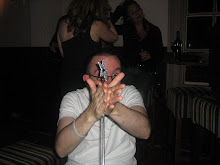Taking a step away from Bette Davis for one minute we find 1943 nominee The Talk of the Town which I presumed from the stars, Cary Grant and Frank Capra favourite Jean Arthur, was a knockabout screwball comedy. But then I started to watch it and with in the first few minutes Grant's Leopold had been arrested for arson and had escaped from prison. However after that things to take a turn for the 'comedy of errors' as Leopold arrives at the house of his old friend Nora who agrees to hide him but at the same time is welcoming Professor Lightcap who is renting her property over the summer. To protect Leopold's identity Nora agrees to become Lightcap's temporary secretary and when the Professor discovers Leopold she lies and tells him it is the gardener. Soon the three form a small family but when Lightcap discovers Leopold's true identity he rings the police but again the fugitive goes on the run. Lightcap gets to the bottom of the arson case and finds out that it was an insurance job and he and Leopold gather the evidence together. Leopold is acquitted and Lightcap is accepted to the Supreme Court and proposes to Nora however instead she decides she would rather be with Leopold and the two go off at the end of the film.
The Talk of the Town was definitely an easy film to watch and it did have it moments. All three leads were superb especially Ronald Colman playing the uptight professor who softens when he falls for Nora and Arthur is perfect as the sweet and innocent girl who may not be all she seems. I was surprised that Grant played such an agressive role in this but again he softens when the three of them become a small family and there are definitely moments of homoeroticism between Lightcap and Leopold. The opening scene is almost done as a silent movie with scenes of the fire and newspaper headlines replacing characters explaining the plot, the mob mentality and the lack of justice in Leopold's case are also interesting themes in the film. However I just found the film a little bit too all over the place as it just really didn't seem to make its mind up what it wanted to be - crime thriller, screwball farce or romantic comedy - there were elements of all but really no genre won out which made me a little uneasy. Saying that though it was a good little film but director George Stevens would go on to produce much better work in the next decade with four of his five films from the 1950s being nominated for Best Picture.
Subscribe to:
Post Comments (Atom)


No comments:
Post a Comment